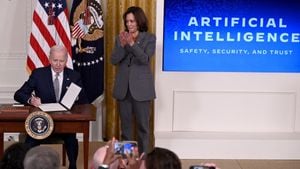Alabama made headlines yet again as it executed Carey Dale Grayson, the third person to die by nitrogen gas execution, at 6:33 PM on November 21, 2024. Grayson was convicted for his involvement in the tragic 1994 murder of Vickie Deblieux, who was just 37 at the time. She was hitchhiking to her mother’s house when she encountered Grayson and three other teenagers, leading to her brutal death.
Alabama Governor Kay Ivey confirmed the execution took place at William C. Holman Correctional Facility and followed Grayson’s attempts to appeal. Just hours before the scheduled execution, the U.S. Supreme Court denied his request for a stay, rejecting the argument from Grayson’s lawyers, who claimed more scrutiny was needed before using nitrogen gas as the execution method.
The gruesome details surrounding Deblieux's murder shocked many. Back on February 21, 1994, after being dropped off near Interstate 59, Deblieux was picked up by Grayson and his accomplices. They drove her to Bald Mountain, without any intention of taking her to safety, before violently assaulting her. Reports indicated excessive brutality, including beating her and eventually standing on her throat, which led to her death. The teenagers discarded her body off a cliff and returned later to mutilate her, inflicting at least 180 wounds.
Grayson’s execution has sparked intense discussions around the ethicality and humanity of nitrogen hypoxia, the method used to carry out death sentences. Alabama introduced nitrogen gas as a method of execution back in 2018, claiming it would provide a more humane alternative to lethal injection, which had faced significant problems and public backlash. Supporters argued it would be less painful, but the recent executions have received mixed reviews from observers.
Media witnesses at the execution reported Grayson exhibiting labored breathing for nearly ten minutes after the gas began flowing. Some noted observed muscle movements they described as involuntary. Grayson reportedly directed obscene gestures and insults toward the prison staff before staff cut off his microphone to stop him from speaking.
John Hamm, Alabama's Department of Corrections commissioner, stated, "The first movements he was doing...in our opinion and staff’s opinion, was all show, just consistent with what he has been doing." This lack of compassion exhibited by Grayson was contrasted starkly against the heartfelt statements made by Dr. Deblieux's daughter, Jodi Haley, who addressed the media after the execution.
Haley expressed the long-lasting impact of her mother’s violent death on her life, noting, "I don’t know what it is like to have a mother... All those opportunities were stolen from her." She elaborated on what she believes is the failure of society to save not only her mother but also Grayson himself, stating, "We decided as punishment for his wrongdoings to take him away all of his tomorrows." The fundamental principles of love and forgiveness weighed heavily upon her plea, as she condemned the notion of revenge as necessary for justice.
Beyond the emotional aftermath of the execution, the mechanics and impact of the method faced scrutiny. The American Civil Liberties Union (ACLU) and various anti-death penalty organizations have strongly criticized nitrogen hypoxia, arguing it is untested and poses significant risk of suffering during executions. Activists like Abraham Bonowitz, from Death Penalty Action, strongly criticized using nitrogen gas based on observers' accounts from previous executions, mentioning how it could cause trauma not only to the executed but to the witnesses as well.
There are growing concerns surrounding the effectiveness and humanity of this method of execution. Critics have highlighted how other countries have moved away from using gas as humane execution methods due to associated suffering and its controversial history. Yet, Alabama stands alone within the U.S. as the only state utilizing nitrogen gas for executions, raising questions about the ethics of its continual use after each imploring call for change from human rights organizations.
Further complicate the dialogue around both Grayson's execution and nitrogen hypoxia is the backdrop of the United States' legal stance toward juvenile offenders. Two of Grayson’s accomplices, who were teenagers at the time of the crime, had their sentences changed to life imprisonment after the U.S. Supreme Court ruled prohibiting the execution of individuals convicted of crimes committed when under the age of 18. Grayson's case serves as reflected on this unfortunate narrative of punishment versus rehabilitation.
The stark reality of Alabama’s criminal justice system has created significant discourse about its capital punishment practices and the moral fiber of such decisions. With six executions carried out in the state this year alone—the highest since 2011—the question arises about whether progress or regression is being made. For the families affected by such tragedies, resolutions remain fleeting as they grapple with the intersection of justice and loss.
Carey Grayson’s execution may bring closure for the daughter of Vickie Deblieux but opens up broader dialogues around the morality of the death penalty itself and the systemic issues within the U.S. criminal justice framework. The effects of such punitive measures echo through society, questioning what justice truly looks like and whether it promotes healing or deepens the cycles of pain.



